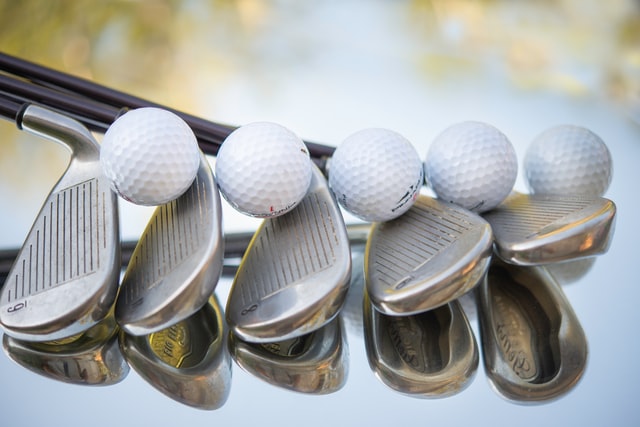Rinse the golf balls with a hose and dry them with a towel to remove any dried-out dirt or muck.
Please keep in mind that how much dish soap you use will be determined on the number of balls you’re washing and how unclean they are. Rinse the golf balls with clean water after removing them from the water and wipe them dry with a clean, dry cloth. Allow your golf balls to air dry for a few hours before hitting the course.
There is an option that may be helpful for individuals who find the foregoing approach onerous. To clean their balls, many golfers, even pros, use the dishwasher.
To keep the balls stable throughout the wash cycle, put them in the silverware basket. Many people believe that using the dishwasher to clean your golf balls is not only a convenient and fast way to clean them, but also a quality check. Because mucky dirt requires a thorough cleaning, rubbing the golf ball with a solution rather than soaking it in water is important.
The dirt and sludge may be removed off the ball using a mix of water and baking soda. Aside from the solution, it’s a good idea to soak the balls in a warm water and vinegar solution to get rid of the dirt from the ball’s more difficult locations. If a baking soda and water solution fails to remove the grime, a bleaching chemical such as Hydrogen Peroxide will do it without the use of a sponge or towel.
Table of Contents
Cleaning Pen Marks
Paint or pen marks may be seen on several of these balls. Some markers or paints may be cleaned with soap and bleach, while others need a more thorough cleaning. If the marks persist after thorough washing, dab them with nail polish remover-soaked tissue. Because sharpie pens are quite persistent, a vinegar or acetone solution should be used to remove the stain or mark. Lacquer thinner may be needed in certain cases.
The balls must be dipped in the detergent solution and washed with water once the required solution has been applied. Overall, golf equipment may get filthy rapidly, just like any other outdoor activity. Leaving your golf ball filthy, on the other hand, has a number of disadvantages, ranging from affecting the ball’s aerodynamics to degrading its quality.
Important Points to Remember
- When cleaning your golf ball, it’s best to stay away from acidic substances. It’s preferable for the ball to be less gleaming than for it to be damaged.
- While it is a good idea to keep the golf balls soaked in water overnight, it is not recommended to do so for the whole day.
- Golf balls may only be cleaned between the holes during a game, according to USGA regulations. Cleaning the ball on the green is prohibited because it may result in ball tampering, for which the player might be penalised one stroke.
How do you clean golf balls the most effectively?
When washing used golf balls, dish soap is the finest option. Soak the golf balls for around 30 minutes in the water. The soapy solution loosens much of the caked-on grime and old stains during this period.
How can you restore the appearance of ancient golf balls?
Soaking the balls in bleach not only removes any discolouration, but it also sterilises them, removing any fungus or algae.
- The dirt and sludge may be removed off the ball using a mix of water and baking soda. Aside from the solution, it’s a good idea to soak the balls in a warm water and vinegar solution to get rid of the dirt from the ball’s more difficult locations.
- Many golfers put their golf balls in the dishwasher. Dishwasher washing should not harm excellent quality golf balls purchased from a reputable manufacturer. To keep golf balls stable throughout the wash cycle, put them in the silverware basket.
Are golf balls harmed by bleach?
Bleach Will It Harm Golf Balls? The harsh wires would undoubtedly scrape and destroy the balls if you used bleach and then scrubbed them with a wire brush.
Are golf balls supposed to be washed?
A clean golf ball will fly straighter and quicker than one that has been soiled. Dirt, sludge, and debris may clog the dimples of a dirty golf ball, reducing its aerodynamics. This means your in-game performance will suffer, and your whole golfing experience may be ruined as a result.
Can you boil golf balls?
When the cores of golf balls are boiled, the molecules are broken down, making them less able to restore their form when subjected to external forces. In both circumstances, the golf balls’ molecular structure is altered, resulting in a loss of elasticity.
Do golf balls go bad with age?
A golf ball in excellent aesthetic condition will last 5-7 years, or seven rounds of 18 holes. Scuff marks from poor play, on the other hand, are more likely to cause a player to change golf balls sooner rather than later.
What’s the best way to keep my golf balls warm throughout the winter?
Golfsmith’s website gives ideas on how to keep golf balls warm, including placing a towel in the bottom of a pot with two quarts of water, heating it to 120 degrees Fahrenheit (roughly the temperature of extremely hot tap water), leaving them in there for 30 minutes, drying them, and storing them in Ziploc.
Is it possible to keep golf balls dry?
Golf balls are waterproof, which means they won’t be harmed if you drop them in the water. Golfers may save money by salvaging and reusing their clubs instead of purchasing new ones.
Golf balls that have been used before
Recycled balls don’t have much of a drawback. The only recycled balls that have a significant problem are those that have been scorched by fire or have had their covers chipped and peel away. For the ordinary golfer, though, the difference is insignificant.
